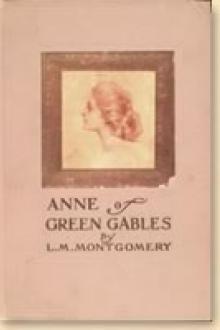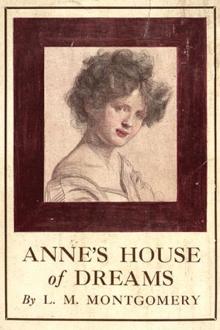Anne of the Island, Lucy Maud Montgomery [short story to read TXT] 📗

- Author: Lucy Maud Montgomery
- Performer: 0553213172
Book online «Anne of the Island, Lucy Maud Montgomery [short story to read TXT] 📗». Author Lucy Maud Montgomery
John Douglas met them at the door and took them into the sitting-room, where his mother was enthroned in an armchair.
Anne had expected old Mrs. Douglas to be tall and thin, because Mr. Douglas was. Instead, she was a tiny scrap of a woman, with soft pink cheeks, mild blue eyes, and a mouth like a baby’s. Dressed in a beautiful, fashionably-made black silk dress, with a fluffy white shawl over her shoulders, and her snowy hair surmounted by a dainty lace cap, she might have posed as a grandmother doll.
“How do you do, Janet dear?” she said sweetly. “I am so glad to see you again, dear.” She put up her pretty old face to be kissed. “And this is our new teacher. I’m delighted to meet you. My son has been singing your praises until I’m half jealous, and I’m sure Janet ought to be wholly so.”
Poor Janet blushed, Anne said something polite and conventional, and then everybody sat down and made talk. It was hard work, even for Anne, for nobody seemed at ease except old Mrs. Douglas, who certainly did not find any difficulty in talking. She made Janet sit by her and stroked her hand occasionally. Janet sat and smiled, looking horribly uncomfortable in her hideous dress, and John Douglas sat without smiling.
At the tea table Mrs. Douglas gracefully asked Janet to pour the tea. Janet turned redder than ever but did it. Anne wrote a description of that meal to Stella.
“We had cold tongue and chicken and strawberry preserves, lemon pie and tarts and chocolate cake and raisin cookies and pound cake and fruit cake — and a few other things, including more pie — caramel pie, I think it was. After I had eaten twice as much as was good for me, Mrs. Douglas sighed and said she feared she had nothing to tempt my appetite.
“`I’m afraid dear Janet’s cooking has spoiled you for any other,’ she said sweetly. `Of course nobody in Valley Road aspires to rival HER. WON’T you have another piece of pie, Miss Shirley? You haven’t eaten ANYTHING.’
“Stella, I had eaten a helping of tongue and one of chicken, three biscuits, a generous allowance of preserves, a piece of pie, a tart, and a square of chocolate cake!”
After tea Mrs. Douglas smiled benevolently and told John to take “dear Janet” out into the garden and get her some roses. “Miss Shirley will keep me company while you are out — won’t you?” she said plaintively. She settled down in her armchair with a sigh.
“I am a very frail old woman, Miss Shirley. For over twenty years I’ve been a great sufferer. For twenty long, weary years I’ve been dying by inches.”
“How painful!” said Anne, trying to be sympathetic and succeeding only in feeling idiotic.
“There have been scores of nights when they’ve thought I could never live to see the dawn,” went on Mrs. Douglas solemnly. “Nobody knows what I’ve gone through — nobody can know but myself. Well, it can’t last very much longer now. My weary pilgrimage will soon be over, Miss Shirley. It is a great comfort to me that John will have such a good wife to look after him when his mother is gone — a great comfort, Miss Shirley.”
“Janet is a lovely woman,” said Anne warmly.
“Lovely! A beautiful character,” assented Mrs. Douglas. “And a perfect housekeeper — something I never was. My health would not permit it, Miss Shirley. I am indeed thankful that John has made such a wise choice. I hope and believe that he will be happy. He is my only son, Miss Shirley, and his happiness lies very near my heart.”
“Of course,” said Anne stupidly. For the first time in her life she was stupid. Yet she could not imagine why. She seemed to have absolutely nothing to say to this sweet, smiling, angelic old lady who was patting her hand so kindly.
“Come and see me soon again, dear Janet,” said Mrs. Douglas lovingly, when they left. “You don’t come half often enough. But then I suppose John will be bringing you here to stay all the time one of these days.” Anne, happening to glance at John Douglas, as his mother spoke, gave a positive start of dismay. He looked as a tortured man might look when his tormentors gave the rack the last turn of possible endurance. She felt sure he must be ill and hurried poor blushing Janet away.
“Isn’t old Mrs. Douglas a sweet woman?” asked Janet, as they went down the road.
“M — m,” answered Anne absently. She was wondering why John Douglas had looked so.
“She’s been a terrible sufferer,” said Janet feelingly. “She takes terrible spells. It keeps John all worried up. He’s scared to leave home for fear his mother will take a spell and nobody there but the hired girl.”
Three days later Anne came home from school and found Janet crying. Tears and Janet seemed so incongruous that Anne was honestly alarmed.
“Oh, what is the matter?” she cried anxiously.
“I’m — I’m forty today,” sobbed Janet.
“Well, you were nearly that yesterday and it didn’t hurt,” comforted Anne, trying not to smile.
“But — but,” went on Janet with a big gulp, “John Douglas won’t ask me to marry him.”
“Oh, but he will,” said Anne lamely. “You must give him time, Janet
“Time!” said Janet with indescribable scorn. “He has had twenty years. How much time does he want?”
“Do you mean that John Douglas has been coming to see you for twenty years?”
“He has. And he has never so much as mentioned marriage to me. And I don’t believe he ever will now. I’ve never said a word to a mortal about it, but it seems to me I’ve just got to talk it out with some one at last or go crazy. John Douglas begun to go with me twenty years ago, before mother died. Well, he kept coming and coming, and after a spell I begun making quilts and things; but he never said anything about getting married, only just kept coming and coming. There wasn’t anything I could do. Mother died when we’d been going together for eight years. I thought he maybe would speak out then, seeing as I was left alone in the world. He was real kind and feeling, and did everything he could for me, but he never said marry. And that’s the way it has been going on ever since. People blame ME for it. They say I won’t marry him because his mother is so sickly and I don’t want the bother of waiting on her. Why, I’d LOVE to wait on John’s mother! But I let them think so. I’d rather they’d blame me than pity me! It’s so dreadful humiliating that John won’t ask me. And WHY won’t he? Seems to me if I only knew his reason I wouldn’t mind it so much.”
“Perhaps his mother doesn’t want him to marry anybody,” suggested Anne.
“Oh, she does. She’s told me time and again that she’d love to see John settled before her time comes. She’s always giving him hints — you heard her yourself the other day. I thought I’d ha’ gone through the floor.”
“It’s beyond me,” said Anne helplessly. She thought of Ludovic Speed. But the cases were not parallel. John Douglas was not a man of Ludovic’s type.
“You should show more spirit, Janet,” she went on resolutely. “Why didn’t you send him about his business long ago?”
“I couldn’t,” said poor Janet pathetically. “You see, Anne, I’ve always been awful fond of John. He might just as well keep coming as not, for there was never anybody else I’d want, so it didn’t matter.”
“But it might have made him speak out like a man,” urged Anne.
Janet shook her head.
“No, I guess not. I was afraid to try, anyway, for fear he’d think I meant it and just go. I suppose I’m a poor-spirited creature, but that is how I feel. And I can’t help it.”
“Oh, you COULD help it, Janet. It isn’t too late yet. Take a firm stand. Let that man know you are not going to endure his shillyshallying any longer. I’LL back you up.”
“I dunno,” said Janet hopelessly. “I dunno if I could ever get up enough spunk. Things have drifted so long. But I’ll think it over.”
Anne felt that she was disappointed in John Douglas. She had liked him so well, and she had not thought him the sort of man who would play fast and loose with a woman’s feelings for twenty years. He certainly should be taught a lesson, and Anne felt vindictively that she would enjoy seeing the process. Therefore she was delighted when Janet told her, as they were going to prayer-meeting the next night, that she meant to show some “sperrit.”
“I’ll let John Douglas see I’m not going to be trodden on any longer.”
“You are perfectly right,” said Anne emphatically.
When prayer-meeting was over John Douglas came up with his usual request. Janet looked frightened but resolute.
“No, thank you,” she said icily. “I know the road home pretty well alone. I ought to, seeing I’ve been traveling it for forty years. So you needn’t trouble yourself, MR. Douglas.”
Anne was looking at John Douglas; and, in that brilliant moonlight, she saw the last twist of the rack again. Without a word he turned and strode down the road.
“Stop! Stop!” Anne called wildly after him, not caring in the least for the other dumbfounded onlookers. “Mr. Douglas, stop! Come back.”
John Douglas stopped but he did not come back. Anne flew down the road, caught his arm and fairly dragged him back to Janet.
“You must come back,” she said imploringly. “It’s all a mistake, Mr. Douglas — all my fault. I made Janet do it. She didn’t want to — but it’s all right now, isn’t it, Janet?”
Without a word Janet took his arm and walked away. Anne followed them meekly home and slipped in by the back door.
“Well, you are a nice person to back me up,” said Janet sarcastically.
“I couldn’t help it, Janet,” said Anne repentantly. “I just felt as if I had stood by and seen murder done. I HAD to run after him.”
“Oh, I’m just as glad you did. When I saw John Douglas making off down that road I just felt as if every little bit of joy and happiness that was left in my life was going with him. It was an awful feeling.”
“Did he ask you why you did it?” asked Anne.
“No, he never said a word about it,” replied Janet dully.
Anne was not without a feeble hope that something might come of it after all. But nothing did. John Douglas came and took Janet driving, and walked home from prayer-meeting with her, as he had been doing for twenty years, and as he seemed likely to do for twenty years more. The summer waned. Anne taught her school and wrote letters and studied a little. Her walks to and from school were pleasant. She always went by way of the swamp; it was a lovely place — a boggy soil, green with the greenest of mossy hillocks; a silvery brook meandered through it and spruces stood erectly, their boughs a-trail with gray-green





Comments (0)